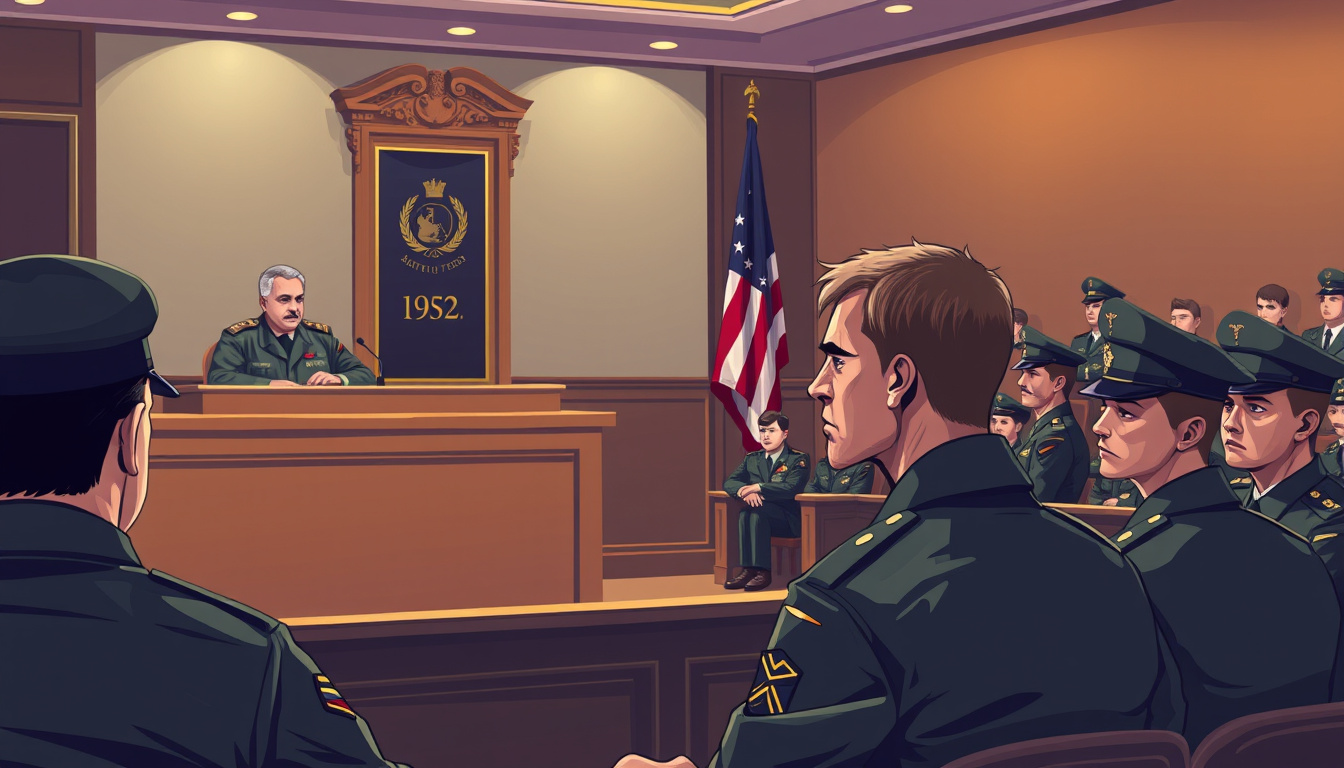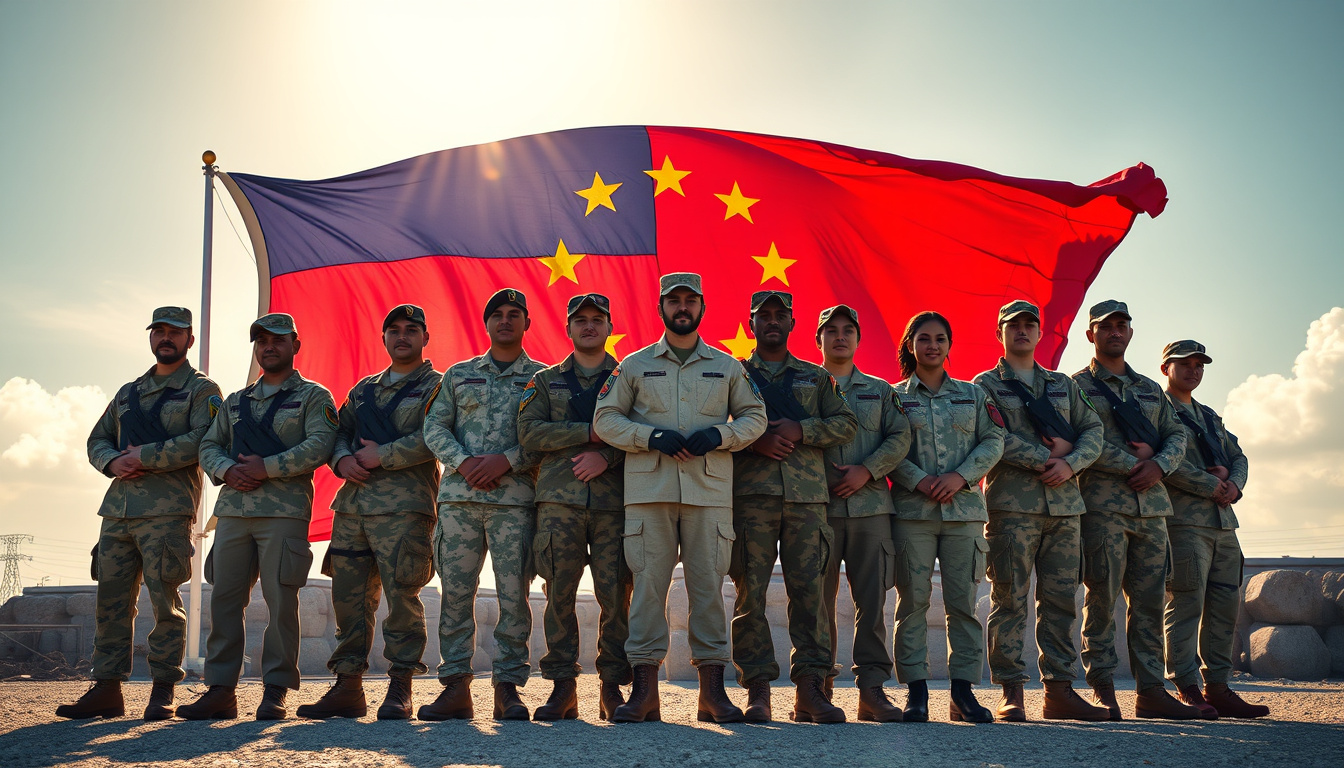When it comes to upholding the integrity and discipline within the military, the Uniform Code of Military Justice (UCMJ) plays a crucial role.
Among its numerous provisions, Article 107 specifically addresses the issue of lying, emphasizing the importance of honesty and truthfulness in the armed forces.
For military servicemembers and their families, understanding the implications of this article is vital, especially if they are facing charges related to dishonesty or are involved in an administrative separation process.
This blog article will delve into the intricacies of Article 107, discuss the consequences of violating this provision, outline the prosecution process, present potential defense strategies, and examine the impact of lying on a military member’s reputation.
By the end of this article, you will have a clearer understanding of the UCMJ lying article and the steps to take if you or a loved one is facing such allegations.

Key Takeaways
- The UCMJ serves as the foundation of military law in the United States.
- Article 107 specifically addresses the offense of lying within military operations.
- Violating Article 107 can lead to serious consequences, including court-martial and disciplinary action.
- Defense strategies against lying charges must be carefully planned to effectively contest the allegations.
- Lying undermines military integrity and can have long-lasting repercussions on a service member’s reputation.
Introduction to the UCMJ
The Uniform Code of Military Justice (UCMJ) serves as the foundation of military law in the United States, providing a comprehensive set of rules and regulations that govern the conduct of military personnel.
One of the key aspects of the UCMJ is its detailed provisions addressing offenses related to dishonesty, including lying.
Under Article 107 of the UCMJ, known as the ucmj lying article, servicemembers can face serious consequences for making false official statements or for lying during investigations.
Understanding the implications of this article is crucial for military servicemembers and their families, especially when navigating allegations that could potentially lead to court martial or administrative discipline.
This introduction outlines the structure and significance of the UCMJ, with a particular focus on the ucmj lying article, illustrating the potential impact of dishonesty on one’s military career and the legal processes involved.
Understanding Article 107: Lying
When it comes to military law, understanding the intricacies of the Uniform Code of Military Justice (UCMJ) is essential, especially concerning offenses that could lead to severe repercussions.
One critical charge under the UCMJ is found in Article 107, which addresses lying or making false statements.
This article prohibits members of the armed forces from providing false information to a member of the armed forces, or to a civilian employee of the government regarding any matter related to military duties.
The implications of a charge under UCMJ lying article can be dire, including potential court martial, loss of rank, and impacts on future career prospects.
It’s important for servicemembers and their families to understand the rules outlined in this article and the possible defenses available.
Whether you are facing charges or simply seeking to understand your rights and responsibilities, knowing how Article 107 applies can help you make informed decisions and potentially navigate through an administrative separation process or court martial proceeding.
‘The truth will set you free, but first it will make you miserable.’ – James A. Garfield

Consequences of Violating Article 107
### Consequences of Violating Article 107: Understanding the UCMJ Lying Article
In the military, integrity is paramount, and maintaining trust within the ranks is crucial for operational effectiveness.
Article 107 of the Uniform Code of Military Justice (UCMJ) specifically addresses lying and false statements, making it illegal for servicemembers to provide false official statements or to deliberately mislead authorities.
As a servicemember or a family member navigating this serious legal terrain, it is important to understand the implications and consequences that can arise from violating this UCMJ lying article.
When a servicemember is found guilty of violating Article 107, the consequences can be severe.
The primary penalty is punishment under the UCMJ, which may range from non-judicial punishment (NJP), commonly known as an Article 15, to a court-martial, depending on the severity of the offense and the circumstances surrounding it.
Penalties can include loss of pay, reduction in rank, or even confinement.
Additionally, a conviction under Article 107 can have lasting impacts on one’s military career, leading to administrative actions such as reprimands, loss of security clearance, and even military separation, which can affect the servicemember’s benefits and future employment opportunities.
Moreover, the social ramifications within the military community can be significant.
A servicemember accused of lying may face loss of trust and respect from peers and superiors, making it difficult to continue serving effectively.
Family members of those facing allegations under the UCMJ lying article may also experience emotional and financial strain as they navigate the potential fallout from these accusations.
Understanding the implications of Article 107 and seeking appropriate legal support is crucial for affected servicemembers and their families.
Legal counsel experienced in military law can provide guidance on the intricacies of the UCMJ process, help prepare a defense, and explore options for mitigating penalties.
It is essential to address such allegations proactively and comprehensively to protect one’s career and future.
Process of Prosecution Under UCMJ
Understanding the process of prosecution under the Uniform Code of Military Justice (UCMJ) is crucial for military servicemembers and their families, especially for those facing allegations of misconduct or criminal behavior.
The UCMJ is a federal law that establishes the legal framework for military justice, delineating offenses and the corresponding procedures for prosecution.
One significant aspect of this process involves accusations related to UCMJ lying articles, particularly Article 107, which addresses false official statements.
When servicemembers are accused of violating this provision, the implications can be severe, including potential court martial.
The prosecution process typically begins with an investigation, led either by military law enforcement or an internal command inquiry.
The findings of this investigation will determine if formal charges should be brought forward, leading to either non-judicial punishment or a court martial.
Should the case proceed to court martial, the accused will face a formal trial where evidence will be presented, and the accused has the right to defend themselves, often with the assistance of a military defense attorney.
It’s essential for servicemembers to understand their rights and the complexities involved in navigating UCMJ procedures, especially in cases involving allegations of dishonesty.
Legal representation can significantly impact the outcome of a case, making it vital for those facing allegations to seek knowledgeable counsel.

Defense Strategies Against Lying Charges
When facing accusations under the UCMJ related to lying, understanding the nature of these charges and the avenues for defense is crucial for military servicemembers and their families.
The UCMJ (Uniform Code of Military Justice) has strict provisions against false statements, often resulting in severe consequences such as court martial or administrative separation.
Therefore, an effective strategy against these allegations must be developed promptly.
First, it is essential to gather and review all evidence related to the accusation, including witness statements, documentation, and any relevant communications that can support your case.
A thorough examination of the circumstances surrounding the accusation can reveal inconsistencies or motives behind the charges.
Additionally, seeking representation from a skilled military defense attorney who specializes in UCMJ matters is vital.
They can provide legal insights and create a tailored defense strategy that highlights your rights and any procedural errors made during the accusal process.
Privacy is also significant; being cautious with communications and refraining from discussing case details can prevent self-incrimination and safeguard your position.
Lastly, exploring the possibility of alternative resolutions, such as non-judicial punishment (NJP), may lead to a less punitive outcome, preserving your career and reputation within the military.
In summary, facing UCMJ lying charges requires a proactive approach emphasizing evidence, legal representation, and careful communication.
Impact of Lying on Military Reputation
Lying within the military context can have severe ramifications, particularly under the Uniform Code of Military Justice (UCMJ).
The UCMJ categorically prohibits dishonesty, and engaging in lying can lead to serious consequences for servicemembers, including a court-martial, administrative separation, or other disciplinary actions.
An UCMJ lying article exposes not only the individual’s integrity but also tarnishes the reputation of their unit and the military as a whole.
The military values honesty and integrity, essential qualities for maintaining trust and morale among service members and leadership.
When a servicemember is found to have lied, whether during an investigation, in official statements, or even in day-to-day operations, it compromises their credibility and can lead to a loss of rank, pay, or other significant repercussions that affect not only the individual but also their families.
This article serves as a cautionary tale for military members about the grave impacts of lying and the importance of upholding the values of honesty and accountability inherent in military service.

Conclusion: Upholding Integrity in the Military
In the military, integrity is not just a value; it is a fundamental principle that guides every action and decision.
When faced with potential violations of the UCMJ, especially allegations related to lying or dishonesty, it is crucial to navigate the situation judiciously.
Understanding the intricacies of the UCMJ lying article can provide servicemembers and their families with the knowledge needed to address accusations appropriately.
Engaging with legal counsel who specializes in military law is imperative to effectively challenge any charges and to protect one’s rights.
Upholding integrity is essential not only for personal reputation but also for maintaining the trust and cohesion necessary within military ranks.
Remember, facing accusations does not define you; instead, how you respond can highlight your character and commitment to the values upheld by the armed forces.
Frequently Asked Questions
What is the UCMJ?
The Uniform Code of Military Justice (UCMJ) is the legal framework that governs the conduct of the United States Armed Forces.
It establishes the military justice system and outlines the legal rights and responsibilities of service members.
What does Article 107 of the UCMJ entail?
Article 107 addresses the act of lying, specifically prohibiting service members from making false statements in official matters.
This includes providing false testimony, lying in written statements, or making misleading assertions to superiors.
What are the consequences of violating Article 107?
Violating Article 107 can lead to various penalties including non-judicial punishment, court-martial, and even dishonorable discharge.
Such outcomes can severely impact a service member’s career and reputation in the military.
How is a service member prosecuted under the UCMJ for lying?
Prosecution under the UCMJ for violations like lying involves an investigation, gathering of evidence, and potentially a court-martial.
The individual is entitled to legal representation and may present a defense against the charges.
What defense strategies are available against lying charges under Article 107?
Defense strategies may include demonstrating a lack of intent to deceive, establishing that the statement was not false, or showing that the individual was under duress or misunderstanding.
It’s critical to consult with a knowledgeable military defense lawyer for the best approach.
If you or a loved one is under investigation or facing charges under the UCMJ, don’t wait to protect your future. Contact Gonzalez & Waddington, Attorneys at Law. Our battle-tested military defense lawyers have successfully defended service members worldwide against the most serious military offenses. Call us today for a confidential consultation and put our elite military defense attorneys in your corner.
Related Posts
- Article 119 UCMJ Voluntary Manslaughter
- Understanding Article 92 UCMJ: Navigating Violations of Lawful Orders on Sexual Conduct
- How to Select the Best Military Defense Lawyers: A Comprehensive Guide for Servicemembers and Their Families
- Top Common Mistakes Service Members Make After a Sexual Assault Accusation and How to Avoid Them



